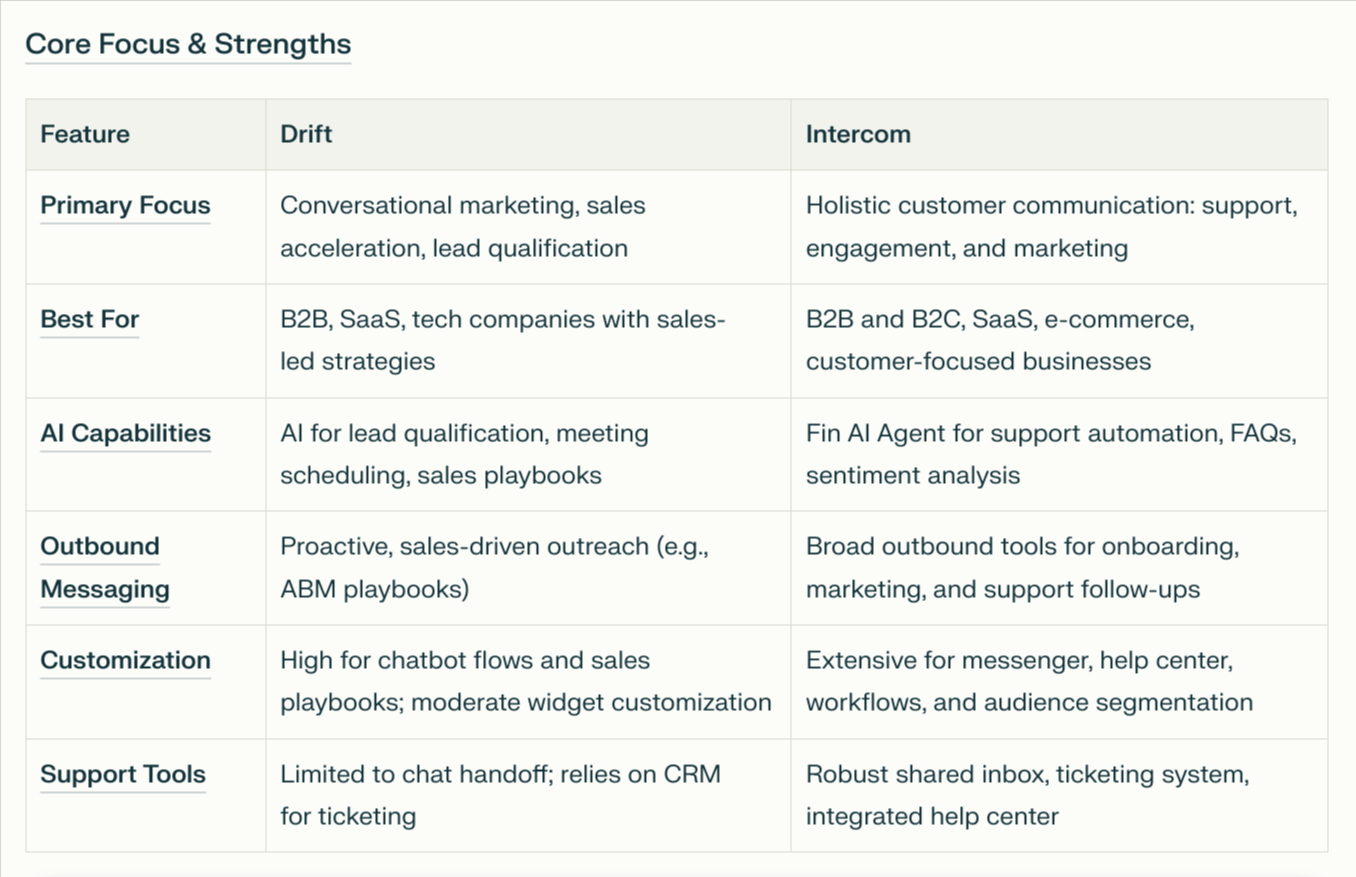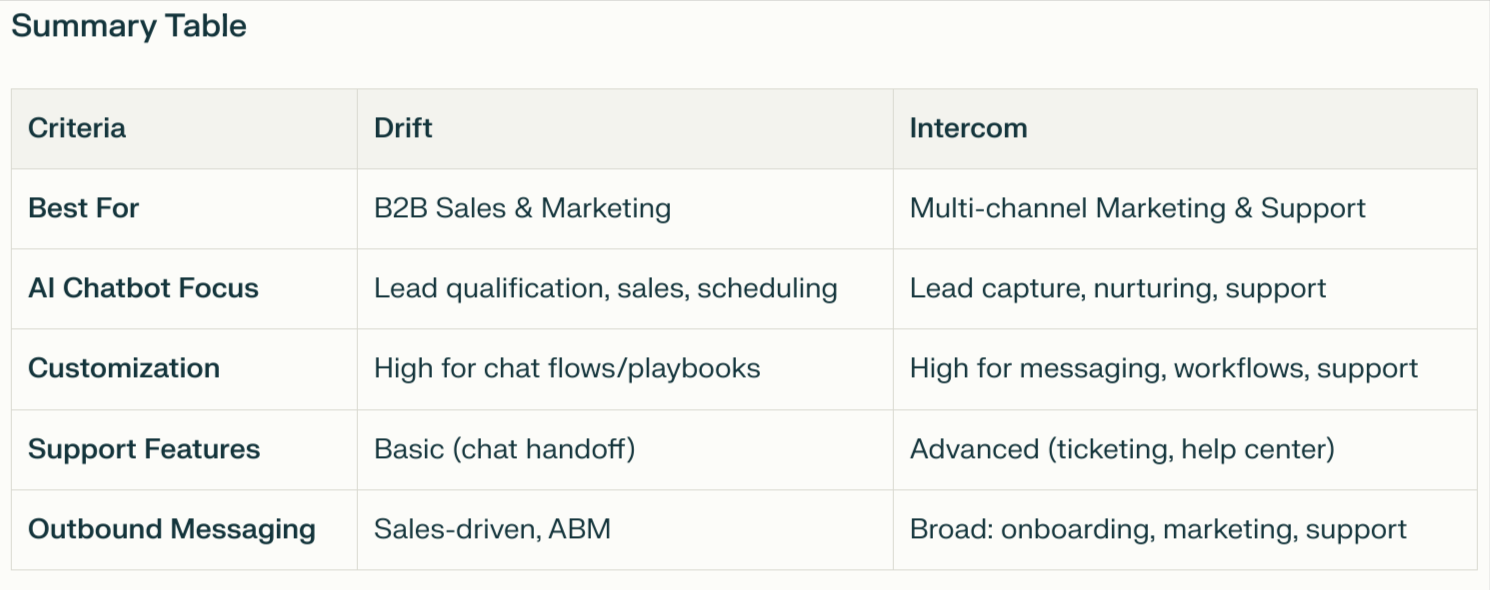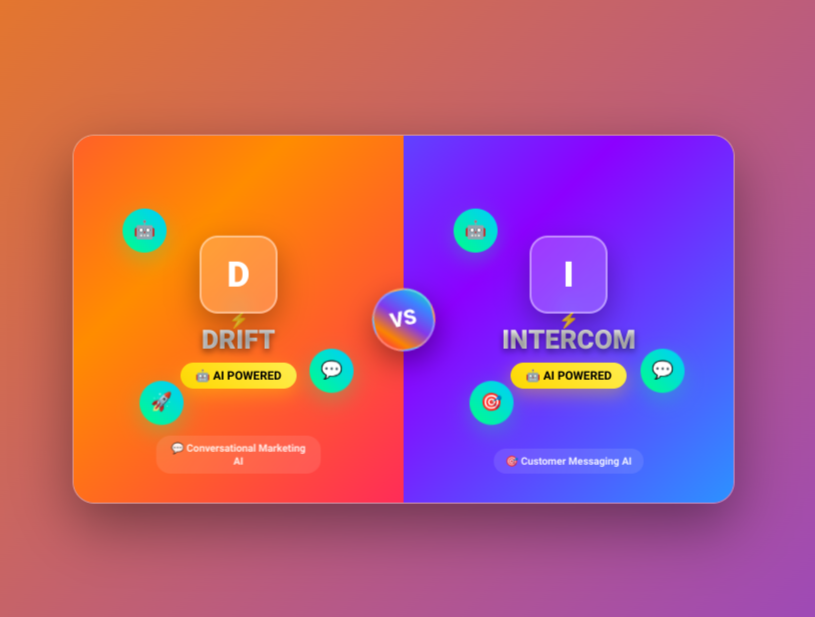Deciding between Drift and Intercom? Drift excels in sales-focused lead qualification for B2B companies, while Intercom offers a holistic solution spanning marketing, sales, and support. Your choice depends on your priority: accelerating sales pipelines or creating comprehensive customer experiences across all touchpoints.
Click here to read more about Drift AI https://amzoraltd.com/drift-ai-chatbot-marketing-pricing-with-features-cost-guide/
Key Takeaways
- Drift excels in sales-driven conversational marketing with powerful lead qualification and meeting scheduling capabilities
- Intercom offers a more comprehensive solution that spans marketing, sales, and customer support with robust segmentation
- Your business type and goals should determine your choice: B2B sales acceleration (Drift) vs holistic communication (Intercom)
- Both platforms offer advanced AI capabilities but differ in their primary focus and implementation
- Content Marketing Agent helps businesses integrate the right chatbot solution for their specific marketing needs
Core Platform Differences That Define Your Choice
1. Primary focus and ideal business types
Drift and Intercom approach chatbot marketing from distinctly different angles. Drift specializes in conversational marketing, sales acceleration, and lead qualification – making it the preferred choice for B2B SaaS and tech companies with sales-led strategies. The platform is built from the ground up to convert website visitors into qualified leads and accelerate sales pipelines.
Intercom takes a more holistic approach to customer communication. It integrates support, engagement, and marketing into a cohesive platform, making it suitable for both B2B and B2C companies. E-commerce businesses, customer-focused SaaS products, and organizations that prioritize comprehensive relationship management typically find Intercom’s broader approach more aligned with their goals.
2. AI capabilities comparison
When examining AI capabilities, both platforms offer sophisticated solutions but with different emphases. Drift’s AI technology focuses on sales enablement with features like automated lead qualification, intelligent meeting scheduling, and customizable sales playbooks that guide prospects through the buying journey. This AI is specifically designed to replicate your best sales practices and engage prospects in meaningful conversations.
Intercom’s AI offering centers around their Fin AI Agent, which specializes in support automation, handling FAQs, and sentiment analysis. This makes Intercom particularly strong for businesses looking to automate customer support while maintaining personalized communication. The platform excels at identifying customer needs and routing them to appropriate resources or team members.
3. Customization options
Customization flexibility varies significantly between the platforms. Drift provides high-level customization for chatbot conversation flows and sales playbooks, allowing detailed control over the qualification and engagement process. This means your sales team can create sophisticated decision trees that mirror their most effective conversation patterns. However, their widget customization capabilities are somewhat more limited in terms of visual branding.
Intercom offers more extensive customization across its entire platform. You can tailor the messenger appearance, help center design, automation workflows, and audience segmentation to match your brand and communication strategy with precision. This level of customization makes Intercom particularly valuable for businesses where consistent brand experience across all customer touchpoints is a priority.

Drift: Sales-Driven
Conversational Marketing
1. Real-time lead qualification automation
Drift’s AI chatbots excel in qualifying leads in real-time as they browse your website. Unlike traditional forms that collect information for later follow-up, Drift engages visitors instantly with personalized conversations that identify their needs, pain points, and buying intent. The platform’s AI evaluates responses against your qualification criteria, routing only the most promising prospects to your sales team.
This real-time qualification is particularly valuable for B2B companies with complex sales processes where understanding a prospect’s specific situation is crucial before investing sales resources. The chatbot can ask specific qualifying questions about budget, timeline, company size, or any other criteria relevant to your business.
2. Meeting scheduling and pipeline acceleration
One of Drift’s standout features is its seamless meeting scheduling capability. When a lead meets your qualification criteria, the AI chatbot can instantly book meetings with the appropriate sales representative based on territory, product specialization, or other custom rules. This eliminates the back-and-forth of traditional scheduling and significantly accelerates your sales pipeline.
The system integrates with your team’s calendars to show real-time availability and automatically sends confirmations and reminders to both parties. For sales-driven organizations, this immediate connection between qualified interest and conversation can dramatically shorten sales cycles.
3. B2B sales optimization features
Drift specializes in optimizing the B2B sales process with features tailored to complex, multi-stakeholder buying journeys. The platform offers account-based insights that help sales teams understand which target accounts are engaging with your website and content. This allows for personalized outreach strategies based on actual engagement data.
The platform also integrates with popular CRM systems to maintain sales data continuity. However, it’s worth noting that Drift has limited support tools and relies on your CRM for comprehensive ticket management, which may be a consideration for teams with complex support requirements.
4. Account-based marketing playbooks
For companies employing account-based marketing (ABM) strategies, Drift offers specialized playbooks that target high-value accounts with personalized messaging. When visitors from target accounts land on your website, Drift can recognize them and deploy customized conversation paths designed specifically for that account’s industry, challenges, and buying stage.
These ABM playbooks align perfectly with Drift’s core strength in sales acceleration and its focus on high-value B2B relationships. The high level of customization available for chatbot flows and sales playbooks makes this particularly effective for sophisticated B2B sales strategies.
Intercom: Comprehensive Customer Communication
1. Multi-channel engagement tools
Intercom distinguishes itself through its robust multi-channel engagement capabilities. Beyond website chat, the platform seamlessly integrates in-app messaging, email campaigns, product tours, and targeted announcements into a cohesive communication strategy. This unified approach ensures consistent messaging across all customer touchpoints.
For businesses with diverse customer communication needs, Intercom’s ability to orchestrate personalized interactions across channels provides a significant advantage. This comprehensive approach makes Intercom particularly suitable for B2B and B2C companies that want to maintain consistent communication throughout the entire customer lifecycle.
2. Advanced support automation with Fin AI
Intercom’s Fin AI Agent represents a significant advancement in support automation. This AI assistant can handle common customer inquiries, provide product information, troubleshoot basic issues, and analyze customer sentiment to determine when human intervention is needed. The system continuously learns from interactions to improve response accuracy over time.
Unlike Drift’s sales-focused AI, Intercom’s Fin AI is designed to balance efficient automation with human-like support interactions. This makes it particularly valuable for businesses that receive a high volume of support inquiries and want to maintain quality while scaling their operations.
3. Customer journey mapping capabilities
Intercom’s platform includes sophisticated customer journey mapping tools that allow businesses to visualize and optimize each stage of customer interaction. From initial website visit through onboarding, product usage, support interactions, and renewal, Intercom provides actionable insights into how customers move through their lifecycle with your business.
These journey mapping capabilities enable targeted interventions at critical moments. For instance, you can identify users who haven’t completed key onboarding steps and automatically trigger personalized guidance. This holistic view of the customer journey makes Intercom particularly valuable for subscription-based businesses focused on reducing churn and increasing customer lifetime value.
4. Knowledge base and help center integration
A standout feature of Intercom is its tightly integrated knowledge base and help center functionality. Unlike Drift, which has limited support tools and relies on external systems for documentation, Intercom offers a comprehensive self-service solution right out of the box. The platform allows you to create, organize, and deliver help articles directly through the chat interface or via a branded help center.
This integration between live support and self-service resources creates a seamless experience for customers while reducing support volume. When customers ask questions in chat, Intercom’s AI can automatically suggest relevant help articles before escalating to a human agent. For businesses that value comprehensive support capabilities, this integrated approach represents a significant advantage.
Making Your Decision: Business-Specific Factors
1. Sales vs. support priorities
The most fundamental decision factor between Drift and Intercom is whether your primary goal is accelerating sales or enhancing overall customer communication. If your business success hinges on efficiently converting leads and shortening sales cycles, Drift’s sales-focused approach will likely deliver better results. Its real-time qualification, meeting scheduling, and B2B optimization features create a powerful engine for sales acceleration.
Conversely, if your business requires a balanced approach to marketing, sales, and support—particularly if customer retention is as important as acquisition—Intercom’s comprehensive platform will serve you better. Its ability to handle the entire customer lifecycle, from prospect to advocate, provides a more cohesive experience for businesses with diverse communication needs.
2. Target audience (B2B vs. B2C)
Your target audience should heavily influence your platform choice. Drift is optimized for B2B scenarios with complex sales processes, multiple stakeholders, and longer sales cycles. Its account-based marketing capabilities, sales playbooks, and qualification tools are specifically designed for business-to-business contexts where personalized sales engagement drives success.
Intercom performs well in both B2B and B2C environments, making it more versatile for businesses with diverse customer types. Its scalable support capabilities and multi-channel engagement tools work particularly well for consumer-facing businesses with high volumes of customer interactions. If your business serves both businesses and consumers, Intercom’s flexibility provides a significant advantage.
3. Integration requirements
Both platforms offer integrations with popular business tools, but your specific tech stack might favor one solution over the other. Drift focuses on integrations with sales and marketing tools like CRM systems, marketing automation platforms, and analytics tools. If your business heavily relies on these systems, Drift’s deep integrations can create a more seamless workflow for your sales and marketing teams.
Intercom offers a broader range of integrations across marketing, sales, and support tools. Its more comprehensive approach makes it suitable for businesses with complex, multi-department tech stacks. Before making a final decision, carefully review the specific integration capabilities of each platform against your current and planned technology investments.
4. Budget considerations
Pricing structure differs significantly between the platforms, with Drift generally positioned as a premium option with higher pricing than Intercom. Drift’s focus on enterprise B2B sales means its pricing reflects the high value it delivers in that specific context. For businesses with substantial B2B sales operations, the investment often pays for itself through accelerated deal closure and improved conversion rates.
Intercom offers more flexible pricing options that can scale with your business needs. Its modular approach allows you to start with essential capabilities and add more sophisticated features as your requirements evolve. For growing businesses or those with budget constraints, Intercom may provide a more accessible entry point while still delivering substantial value.
Choose Based on Your Primary Goal: Sales Conversion or Customer Experience

The choice between Drift and Intercom ultimately comes down to your business’s primary objective. If maximizing sales conversion and accelerating pipeline velocity is your top priority, Drift’s specialized focus on conversational marketing and sales enablement makes it the superior choice. Its AI-powered qualification, meeting scheduling, and B2B optimization features create a powerful engine for revenue growth.
If your goal is to create a cohesive, consistent customer experience across the entire lifecycle—from prospect to loyal customer—Intercom’s comprehensive platform will serve you better. Its balanced capabilities across marketing, sales, and support ensure that no aspect of customer communication falls through the cracks.
Both platforms offer powerful AI chatbot capabilities, but they’re designed to serve different business strategies. By aligning your platform choice with your specific business goals, customer profile, and technical requirements, you’ll maximize the return on your investment in conversational AI marketing.
For expert guidance on implementing and optimizing the right AI chatbot solution for your specific business needs, Content Marketing Agent provides specialized consulting services in marketing technology integration.


